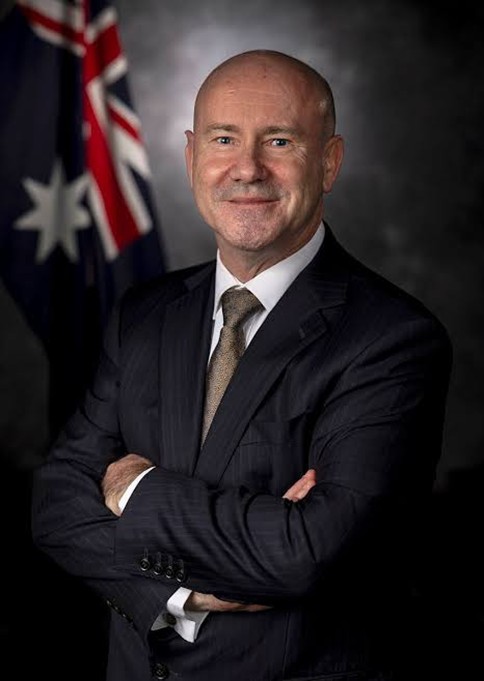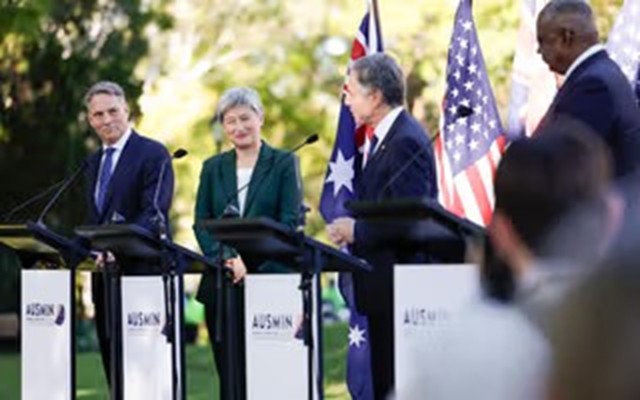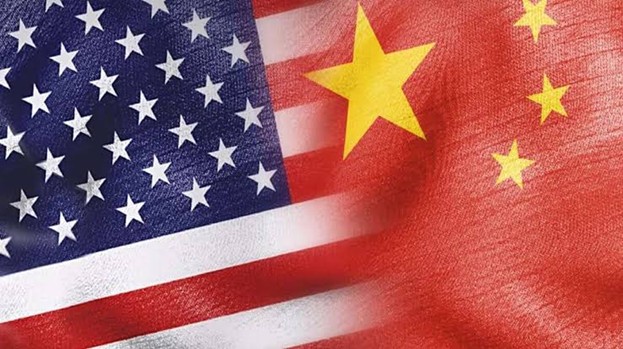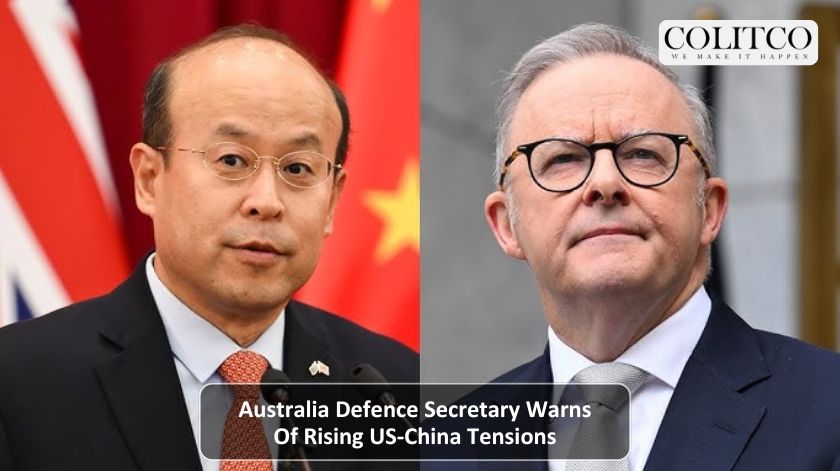The Defence Secretary of Australia has issued an ultimatum about the escalating US-China tensions, classifying the issue as a general concern for the peaceful existence of the whole region. His words demonstrate how fast the strategic situation is changing in the Indo-Pacific; thus, there is an urgent need for security readiness and diplomatic prudence.

Australia’s Defence Secretary warns US-China tensions threaten regional peace, urges readiness.
Why Is Australia Concerned About US-China Tensions?
Moriarty, the Defence Secretary, indicated in a Senate hearing that the probability of a US-China clash has gone up in the past few years. He mentioned that Australia is “very well aware” of the possible consequences of the escalating military rivalry between the two powers.
Moriarty pointed out that the Southeast Asian countries are already feeling the heat of the coercive Chinese activity in the South China Sea. He also warned that such actions could lead to the disruption of the outflow and inflow of goods to and from one of the most important trade routes in the world.
Moriarty’s statements are a clear indication of the growing concern among the Australian government officials that the Indo-Pacific might be entering a new historical period characterised by the uncertainty of the situation and with the risk being raised.
What Does This Mean For The Australian Defence Strategy?
The Secretary of Defence of Australia stressed that the country will have to change its defence posture in order to adapt to the new realities. He pointed out that the defence strategy of Australia is no longer confined to the defence of territory only, but should rather deter coercion and also ensure regional balance.
Moriarty stated the Defence Strategic Review by the government has proposed several measures, such as: reinforcing the deterrent capabilities, acquiring long-range strike assets, and having close cooperation with allies. He remarked that these changes are meant to reinforce Australia’s position as a partner that is less vulnerable to uncertainties regarding security.
He further pointed out that among the factors transforming modern defence readiness are climate change, cyber warfare and the emergence of new technologies.

Australia’s Defence Secretary urges a strategy shift to deter coercion, maintain balance
Is Australia Prepared For Potential Conflict?
When Moriarty was questioned about the possibility of Australia being directly involved in a regional conflict, he accepted that the predicament is “difficult.” He pointed out that while the military of the country is still strong, the speed of regional militarisation is calling for quicker capability upgrades.
Hugh Jeffrey, the Deputy Secretary, indicated that the US-China confrontation is still the scenario that “we worry about most.” The official claimed that the department’s priority is to keep the power in a positive way, thus, by supporting the security of Australia through partnerships with allies, especially during times of crisis, and by neutralising enemies.
Jeffrey’s statements suggest that Australia is not only increasing its defence budget but also developing its own defence industry and improving its cooperation with partners under AUKUS and Quad.
When Could Tensions Escalate Into Conflict?
Though experts did not give a specific timeframe, Moriarty was vocal about the probability of conflicts getting more serious before the year of 2030. He mentioned that the two powers are both progressively increasing their forces in the area of the Indo-Pacific and that even unintentional escalation is still a possibility. He pointed out that diplomatic and crisis management activities would be vital as they could easily lead to a confrontation or a crisis situation.
Moriarty made it clear that Australia’s strategy is to build peace and not to prepare for war. Nonetheless, he added that deterrence only functions with the backing of an up-to-date and credible military power.

Moriarty warns US-China tensions could escalate before 2030 in Indo-Pacific
Australia Will Decide Its Own Defence Role
Defence Industry Minister Pat Conroy assured that Australia will not simply deploy its soldiers to any future US military conflicts. He made it clear that any decision regarding the dispatch of troops would be in the hands of the then-current government.
The policy is a governmental statement of Australia’s strategy to always be able to act according to its own interests, even when defence relations with the US and other partners are getting stronger. Conroy stated the aim is to “keep Australians safe while supporting regional peace and stability.”
Defence Strategy Must Evolve With The Times
The Australian defence strategy must continually adapt to the growing complexity of threats, according to officials. Investment in surveillance, missile systems, and local manufacturing to lessen reliance on foreign suppliers is among the things that senior leaders are advocating for.
They consider that flexibility in strategy, creativity, and regional diplomacy will be the factors that will secure Australia’s long-term safety. This approach not only plans to protect national interests but also to the Indo-Pacific region.
FAQs
Q: What was the cause of the Australian Defence Secretary’s warning?
A: The warning was prompted by the increasing military competition and the assertive activities of China in the Indo-Pacific region.
Q: Would Australia automatically be on the side of the US in case of a conflict?
A: No way. Australia will decide based on national interest which troops to send where.
Q: In what way is Australia changing its defence strategy?
A: By updating its military, boosting its defence budget, and solidifying the cooperation through AUKUS and the Quad.
Q: What is the most important objective of the Australian defence strategy?
A: To discourage coercion, to keep the region stable, and to avoid a big conflict in the Indo-Pacific.












